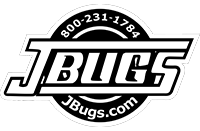




Your cart is currently empty.
Sam here with JBugs.com In
our last video, we discovered a piece of aluminum in the sump of our engine. That
piece, along with the fact that our engine won't turn over completely, leads us
to believe that something is sitting in a cylinder and has put a hole in the
top of our piston.
We start by removing the
spark plugs on the 1-2 side of our engine, and they come out easily as they
should. The number four plug comes out as well, but the number three plug is
very hard to turn. With the help of a breaker bar, we were able to un-thread
the plug and discovered that the end the plug is destroyed along with the
threads in the head. Neither are reusable at this point, so no harm done.
We pop off the valve
cover bale on the 3-4 cylinder head and remove the valve cover, so we can
un-thread the rocker assembly nuts. The rocker assembly is pulled off the head,
and we can see the number three exhaust valve and spring sit up much higher
than the other valves, telling us that the exhaust valve is broken. All four
push rods are pulled out. All eight cylinder head nuts can be un-threaded, so
the cylinder head can be pulled off, the push rod tubes coming along with it.
It's here we see the
extent of the damage. The number three exhaust valve broke off and was hit by a
piston a few times as there obviously a hole in the piston and numerous dents
in the piston and the cylinder head.
Now knowing that we will
have to at least replace the pistons and cylinders, we'll continue the tear
down, removing the cylinder deflect tin. Next, the two cylinders are removed by
lifting them up and away from the engine case. The crank is rotated, so that we
can access the wrist pin clips on the side of the piston. The clips are removed
with a pair of pliers. An appropriately-sized socket and six inch extension are
used to tap the wrist pin through the piston and the connecting rod. Once the
pin is clear of the rod, the piston can be removed.
The crank is rotated
again, so the other cylinder can be removed using the same method. None of the
cylinders, pistons, wrist pins, or clips will be reused, nor will this cylinder
head - so they're all tossed. The opposite side head, cylinders, and pistons
are all removed in the same manner.
Since we found the metal
in our case from the broken piston and there's a large amount of end play on
the crankshaft, we will probably have to dissemble our engine completely. The
tear down continues by removing [the] oil pressure switch. The four nuts for
the oil pump cover are removed. The two case nuts above the oil pump and the
case bolt below the oil pump are loosened.
A chisel and Mj�lnir are used to tap the oil pump out of the case, using the ears on the side of the pump, alternating from side to side, so the pump does not get wedged in the case. Do not pry in between the case and the pump. A flywheel lock is bolted onto the upper engine mount, and the six pressure plate bolts are removed. The pressure plate is pulled off, and the clutch disc is pulled out.
The flywheel lock is
moved to the lower engine stud, and a torque multiplier tool is used to loosen
the flywheel gland nut. The torque multiplier tool negates the need for a large
breaker bar and easily loosens the nut with a ratchet. With the gland nut
loosened, a ratchet and socket are used to un-thread it fully. The flywheel is
pulled off, the rear main seal is removed, followed by the three flywheel
shims, so we can check the crankshaft and bearing end play. As we push the
crank fore and aft through the case, we can see the crank and, unfortunately,
the bearing move.
With the bearing moving
the thrust surface on the case is worn, so the engine will have to be
completely dissembled and rebuilt. This isn't what we were hoping for, but
gives us the opportunity to cover rebuilding an engine. In our next video, we
will complete the disassembly of the engine block and pull apart all that we
can in our workshop before sending the parts out to a machine shop. Stay tuned,
thanks for watching, and of course head to JBugs.com for all your vintage
Volkswagen engine parts and accessories.
Copyright © JBugs.
All rights reserved. All images protected by US and International copyright laws. No part of this website may be reproduced, distributed, or transmitted in any form or by any means.
All Prices subject to change without notice or obligation. Not responsible for typographical or photo errors. "Volkswagen", "VW","Beetle", "Super Beetle", "Bus", "Ghia", "Type 2", "Type 3", "Thing", "Rabbit", "Cabriolet", "Jetta", and "Golf" are trademarked by Volkswagen of America and are used for descriptive purposes only.